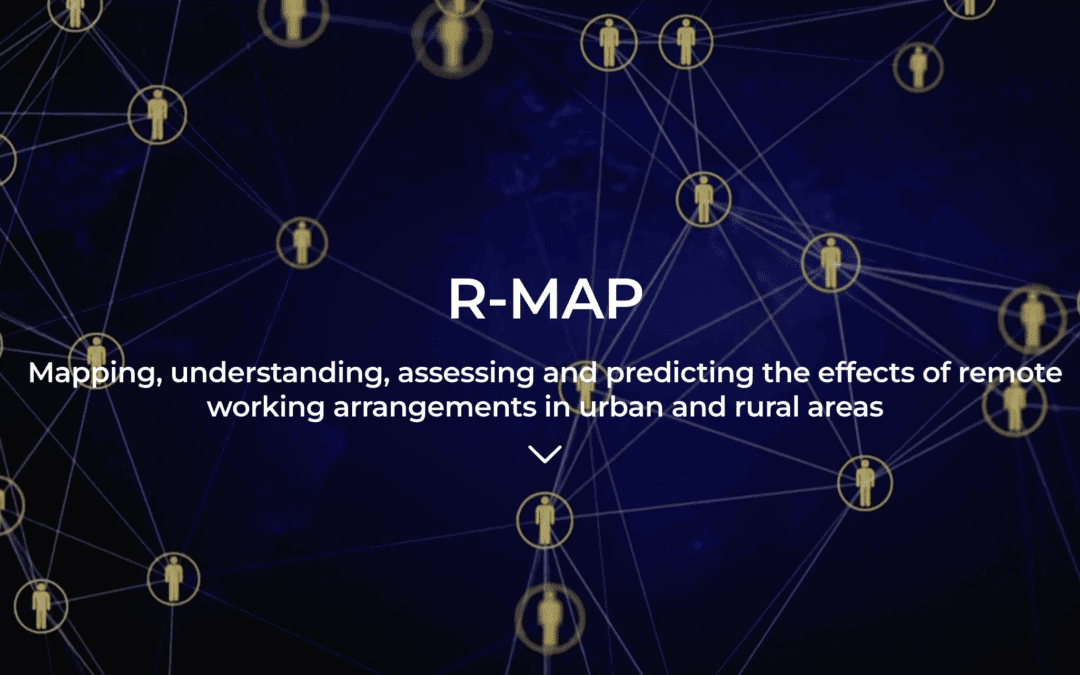|
|
While remote work is one of the fastest-growing trends in the modern world, we have a limited understanding of how it affects our communities, urban and rural.
R-Map is a three-year EU-funded project that started in 2024, which is working to map, understand, assess, and predict the effects of remote working arrangements on socio-economic, spatial, and environmental factors and address the urban-rural gap in Europe and beyond.
Learn more about the R-Map project, some of their first-year findings, and what to expect from the project over the next two years.
R-Map Mission
R-Map’s mission is to understand, forecast, and suggest ways to address the impacts of remote working arrangements on spatial, environmental, economic, and social facets of the urban-rural divide in Europe.
This mission is based on the premise that bridging this gap is a persistent challenge across the continent, but that remote work is changing aspects of that challenge.
The project also believes that leaders and policymakers need reliable information to act fast to mobilize the positive aspects of remote work and find solutions to meet the changing demands of the future workforce.
Horizon Funding
The project was developed in response to an EU Horizon call for proposals in late 2023, looking for projects focused on remote working. According to Horizon:
This phenomenon has the potential to decentralise jobs away from metropolitan areas, creating opportunities for both urban and rural areas, including for the less favoured regions.
The funders noted that the move to remote working has the potential to alleviate house prices and air quality in urban areas and change urban occupation patterns as more businesses move to fully remote working.
The funder also suggested that remote working can offer dynamism to rural areas that can attract necessary investment in services such as health care and transport. It could also help alleviate the challenges of an aging population and skills shortage in rural areas. However, they also acknowledge the potential negative impacts, such as increasing home prices and placing pressure on local infrastructure.
Other projects funded under this stream include REMAKING, which is also examining the impact of remote work through several regional case studies to produce a policy-oriented framework for understanding remote work patterns, and WinWin4WorkLife, which aims to better understand which living and working situations offer the best outcomes for both workers and employees as well as understand the role of culture, regional context, and welfare systems on remote work trends. All three projects are collaborating closely and funded through to 2027.
R-Map Goals
As an extension of the project mission, R-Map has six goals:
- Gain insights into current remote work arrangements
- Develop a framework to assess impacts
- Create a user-friendly visualization platform
- Predict and evaluate effects in regional use cases
- Engage policymakers and stakeholders
- Communicate and deploy synergies
One of the key methodologies R-Map uses to gain insights into current remote work arrangements is regional mapping of remote work patterns in six regions across Europe. These regions are:
- Thessaloniki, Greece
- Twente, Netherlands and Munster, Germany
- Milan, Italy
- Istanbul, Turkey
- Surrey, United Kingdom
- Ostschweiz, Switzerland and Rheintal-Bodenseegebiet, Austria
Synergies
Hubs Travel is also one of the project’s synergistic partners, chosen because it aligns with R-Map’s goals of driving innovation and excellence in remote working practices.
Other Synergistic partners working with R-Map include:
- Mobi-Twin – another EU-funded project looking at spatial mobility and its impact on EU regions
- Future of Work Research Centre, University of Surrey – an innovative and interdisciplinary research center working on evolving work relationships and the factors driving these changes, and their impact on human well-being and fair societies
- Remote-First Institute – provides resources and support to organizations transitioning to remote-first work models
Remaking and WinWin4WorkLife are also considered synergies for R-Map.
One-Year Update
The R-Map project has been running for a year and had its first advisory board meeting in March 2025. The board includes some of the biggest names in the remote work and digital nomad movements, including Maya Middlemiss, Founder of Remote Work Europe, Dimitris Tselios, Co-Founder of Nomad365, and Goncalo Hall, CEO of NomadX.
R-Map also published its year-one progress report in February 2025. The first year of the program has been focused on understanding the current landscape of remote work.
The project has conducted a comprehensive literature review focused on identifying key enablers and barriers, technological advancements that have facilitated hybrid and remote working, and disparities in digital infrastructure, socio-economic conditions, and policy frameworks.
They have also been leveraging data from a variety of sources, including the 2021 European Working Conditions Telephone Survey, 31 stakeholder interviews, 21 in-depth interviews with urban planners, regional authorities, real estate professionals, coworking space founders, and remote work facilitators
The project has also conducted a large-scale survey of more than 20,000 remote and hybrid workers across Europe, examining the challenges and benefits of remote working and future expectations. Initial headline findings of the remote work community include:
- A diverse demographic: 57% male, 40.6% female, with an average age of 41 years old, and many were caregivers, including 28.5% for children, 5.7% for parents, and 5.7% for partners.
- Well educated: 39% holding a Bachelor’s degree, 35% with a Master’s, 9.8% with a PhD, with 64.2% in full-time employment and 6.42% are freelancers or self-employed.
- Preferred working arrangements: respondents showed a strong preference for flexible working, with 38.2% working fully remotely from “anywhere” and 37.4% working fully remotely from home.
- Urban vs rural: 43% of respondents live in urban areas, but 39.8% were interested in suburban living.
- Rights: only around 53.65% were fully aware of their remote worker rights.
- Challenges and benefits: the key challenges identified by respondents were isolation, work-life balance, and productivity issues, while the main benefits were flexibility, reduced commuting, and the ability to choose their living location.
- Organizational policies: respondents had mixed feelings about how their organization managed remote work, with 32.5% saying that they thought their organization had carefully implemented remote work arrangements, while another 32.5% strongly disagreed with this statement.
As one of the largest remote working surveys conducted in Europe, the full findings of this survey will offer valuable insights into the current state of remote work.
Remote Workers Worldwide Survey Findings
R-Map is also leveraging the results of a survey conducted by Remote Workers Worldwide (RWW) with 5,516 participants about remote and hybrid working. Key findings of the survey include:
- Flexibility remains a priority for workers, with 69% of respondents expressing a preference for designing their own work schedule and location. Location was more important than scheduling, with only 10% of respondents prioritizing scheduling alone.
- The vast majority of respondents agreed that remote working contributes to both productivity and work satisfaction. 85% reported increased productivity when working remotely, and 91% said that they were more satisfied with their job as a result of remote working.
- Regarding home base preferences, remote workers expressed a preference for less densely populated areas, though not necessarily rural areas. Only 17% of respondents expressed a preference for urban living, clearly demonstrating a trend towards quieter and more spacious living arrangements.
- Health and wellness are considered universally important, but what that looks like varies greatly. 36% of respondents prioritized wellness activities, 31% prioritized ergonomic working conditions, and 29% prioritized mental health support.
- Almost half of the respondents (49%) suggested that team-building activities were important for remote teams, compared to 29% remaining neutral and 22% considering them unimportant and instead valuing individual productivity and autonomy. This division does not account for the type of work the respondent does or the type of team they work on.
What’s Next?
Based on their comprehensive research, R-Map has designed a conceptual model that serves as a framework for assessing the effects of remote work on spatial, economic, and social structures that can be applied when looking at different regions of Europe. Future work will focus on refining and validating the framework for broader implementation.
This has also led to the first version of the R-Map platform for developing interactive visualization that policy makers can use to explore different aspects of remote work dynamics. The first version is expected to be available to the public in the last quarter of 2025.
The ultimate goal for R-Map is to leverage these findings to provide actionable insights that inform policy and data-driven solutions.








